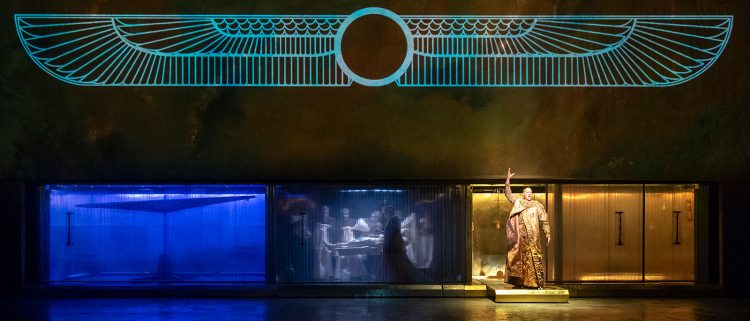By Gregory Moomjy
November 14, 2019
When I first wrote about Akhnaten a few weeks ago, I began by mentioning a few of the famous operas set in Ancient Egypt. Naturally, Aida was on that list. At the time, it seemed almost cliche to include Verdi’s evergreen pharaonic epic in such a catalogue. However, after seeing the opera when it premiered on November 8, I realized Aida is an apt comparison. Like Aida, Akhnaten is, at least in part, a French grand opera
This comparison is most apparent in Act two. Here, the love duet for Akhnaten and his queen Nefertiti, is set against a backdrop of the pharaoh’s reforms. Like Verdi in Aida, Philip Glass uses the pageantry of a historic setting, to explore conflicts between the personal, and the political.
Does it work in all three acts? hard to say. While Akhnaten is similar to Aida in structure, in form they are very different. Verdi’s opera is still in the tradition of the number opera, which divides each act into arias, duets, ensembles, and finales. This allows characters to stand out as individuals, creating an emotional arc. By contrast, Glass’ strict adherence to minimalist repetition, makes his piece more ritualistic.
Southeast Asian and Indian music have always inspired Glass. An important facet of this music is its ability to put listeners in a trance. Theoretically, Akhnaten is an episodic opera, in which a series of tableaux slowly follows each other, as Glass’ music washes over the audience. Ironically the operas most compelling moments occur when the libretto provides opportunities for a direct emotional connection between the audience and the characters. This is why the second act is the most successful part of the opera. Not only is the love duet in that act, but so is the hymn to the sun. Much like the love duet, the hymn provides Akhnaten with a very intimate moment between himself and his god. Unfortunately the religious and stately processions that populate the rest of the opera were too slow. Perhaps a trance like state is not enough when an opera is supposed to be drama through music.
Due to the repetitive nature of the music, it’s honestly hard to evaluate the performers. the principles were all in good voice, and they blended beautifully during the many ensembles. J’nai Bridges had a promising debut as Nefertiti. Disella Larudottir used her sweet lyric soprano to great effect as Akhenaten’s mother, Queen Tye. Anthony Roth Costanzo was mesmerizing in the title role. The conductor, Karen Kamensek, making her Met debut, was a capable interpreter of the score, It was also great to see a woman in the pit. The production, directed by Phelim McDermott was appropriately grand although the decision to include jugglers was a bit distracting. Apparently Akhnaten was the first king to employ jugglers at his court. However, the decision to have then drop their balls simultaneously when Akhnaten was overthrown was incredibly effective theater.
All in all, Glass fans will love this and Glass neophytes should see this at least once. Just go prepared knowing something about Akhnaten and his place in history. You might not get that from the music.
